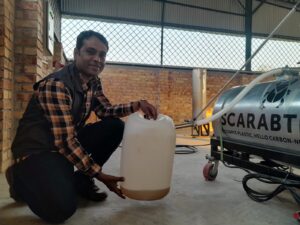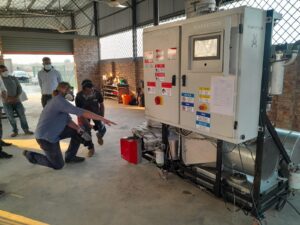Turning plastic waste into profit in Bangladesh
Water & wasteBlog
Plastic pollution is a major challenge for people and the planet. In Bangladesh, we’re working alongside Faridpur’s informal waste workers to add value to flimsy plastic waste. This previously worthless rubbish is now being collected from the streets and sold, instead of being left to pollute the environment.
The growing problem of waste
As cities continue to expand, waste is a growing problem. Waste that’s not disposed of properly damages people’s health and the environment, with people in the poorest communities most affected.
The city of Faridpur in Bangladesh typifies the challenge. It’s home to a growing population of nearly 560,000 people. Waste services are lacking and the informal workers who step in face poor working conditions and discrimination.
New life from old plastic
Our work is creating a new market for plastic waste, which traditionally had no commercial value.
From being worth nothing, this plastic is now being bought at 20 taka (about USD 0.18) a kilogram then cleaned and sold at 25 taka (about USD 0.23) a kilogram. It can then processed into a type of synthetic oil that can be sold.

Fariduzzaman Shapon, Project Manager, shows the oil produced from waste plastic.
It has taken a lot of work to get to this point. We secured use of the land from the local government and partnered with Scarab Tech, a South African company, to equip ourselves with the necessary machinery. This involved sending a team to South Africa for training, and finally getting the machinery shipped, transported inland, and installed in its new home.
A little machine with big potential
This little, mobile, and efficient machine – called a MARK III Beetle – can process 100kg of plastic at a time, and up to 800kg a day. Its makers state that their goal is “to completely eliminate plastic pollution, transitioning both our business and the communities where we operate to 100% renewable energy by 2035.”
Over 300 informal waste collectors and traders (60% of whom are women) are now involved in collecting, sorting, cleaning and selling on the plastic to be processed, helping boost their incomes.

Dellwer, a mechanical engineer from the project team, and Jeffrey, the CEO of Scarabtech, with the Mark III Beetle.
Looking ahead
Tazeen Hossain, our Head of Programme Delivery and Operations in Bangladesh, said:
“We are delighted to share with you that oil production has just started successfully in Faridpur.
“After a tireless journey over the last year, we have come to this significant moment. Hats off to all members of the project team for their hard work and commitment. But please note this is just the beginning, we have a long way to go!”
We’re ambitious and excited about the potential of this project and we hope to be able to expand this work to other towns in Bangladesh in future.
Find out more
Explore Practical Action’s approach to waste management further through our Managing Our Waste 2021 report, which calls for a people-centred approach to the waste crisis, including plastic waste. Discover how, rather than focusing on waste flows and particular types of waste, we must turn attention to the waste services people need, and to opportunities for the most marginalised to be a core part of the solution.